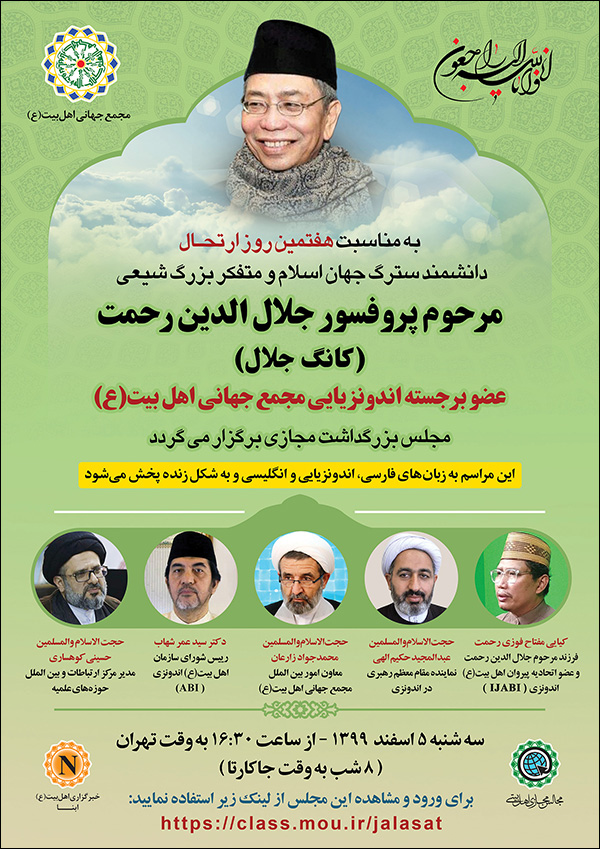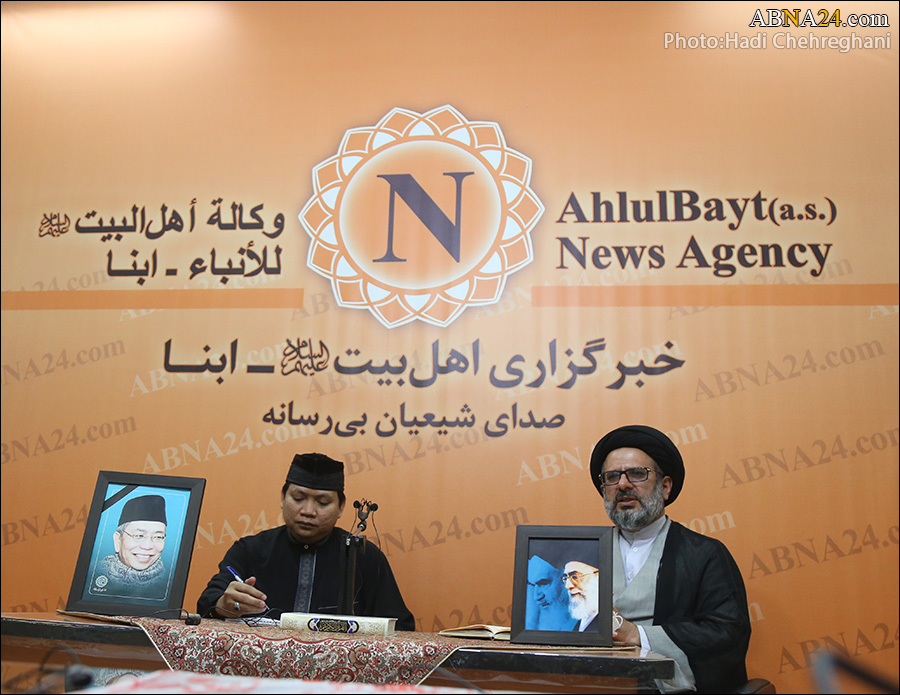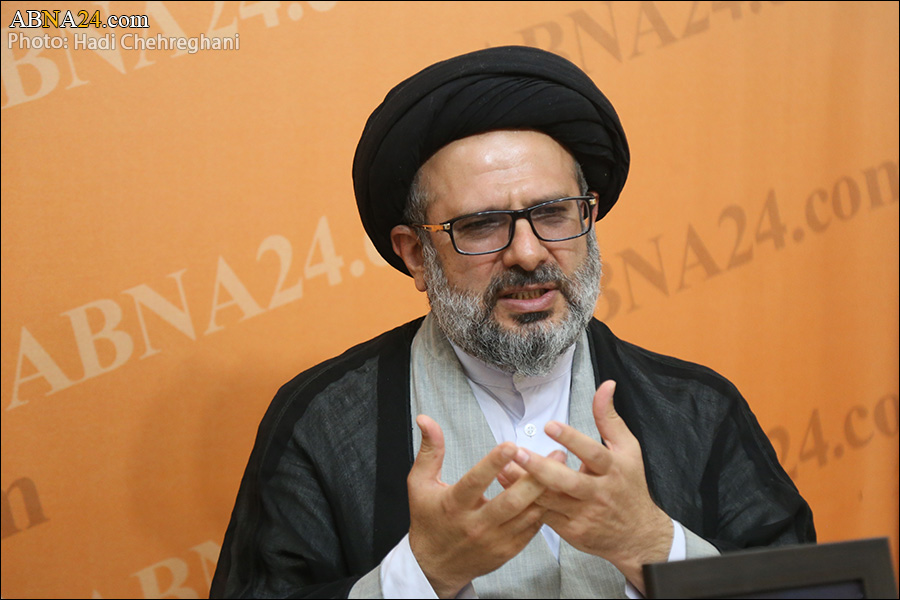Five great lessons from Jalal al-Din Rahmat’s life: Hosseini Kouhsari discussed
The director of the Center for Communication and International Affairs of the Seminaries said, “Dr. Jalal al-Din Rahmat was a man who believed in the school of AhlulBayt (a.s.), but he did not limit himself to the Shiite world and Shiite thoughts and was a trans-denomination and trans-religious figure.”
An online commemoration meeting was held on the occasion of the 7th day of the demise of the great scholar of the Islamic world and great Shiite thinker, the late Professor Jalal al-Din Rahmat, a prominent member of the AhlulBayt (a.s.) World Assembly and the late Chairman of the AhlulBayt (a.s.) Association of Indonesia (IJABI).
In this online meeting which was organized by the AhlulBayt (a.s.) World Assembly and started at 16:30, Tuesday, February 23, 2021, Tehran time (8 pm Jakarta time), some Iranian and Indonesian figures delivered their speech.

Jalal al-Din Rahmat was a trans-denomination and even trans-religious figure: Hosseini Kouhsari
The second guest who delivered his speech at the ceremony was Hojat al-Islam “Sayed Mofid Hosseini Kouhsari”, director of the Center for Communication and International Affairs of the Seminaries. At the beginning of his speech, expressing regret and sorrow on the demise of this great Shiite thinker, he said, “The Grand Sources of Emulation, the director of seminaries, Islamic Scholars and seminary professors issued messages of condolence for the demise of Prof. Jalal al-Din Rahmat.”
Emphasizing that many lessons can be learned from the life and personality of Prof. Jalal al-Din Rahmat, he added, “In this brief opportunity, I will point out five characteristics of the deceased that we can use to learn five great lessons for our lives.”
Hojat al-Islam Hosseini Kouhsari considered the combination of university and seminary studies as the first characteristic of the late prof. Jalal al-Din Rahmat and said, “The first lesson of Dr. Jalaluddin Rahmat’s life was that he tried to combine academic studies and Islamic studies. He also tried to combine attending seminary and attending university. This requires a lot of effort.”
“Today, we need people who are familiar with both the new sciences and religious sciences; people who research on interdisciplinary studies and be influential personalities. The late Jalal al-Din Rahmat was an example of this and in addition to studying at universities in Indonesia, Australia, and the United States, he also studied at the seminary in Qom. A large part of this professor’s life was spent in university and seminary education,” he continued.
“Having a scholarly personality and connections with Indonesian scholars, thinkers, and writers in various countries, Dr. Jalal al-Din Rahmat’s elite connections did not prevent him from communicating with the ordinary people. Dr. Jalal al-Din Rahmat had a lot of services for orphans, the poor, and different segments of the people and his life showed that man can be a thinker and a scholar and can communicate with the elites and the masses of the people, and his benefit will reach everyone,” explained the Director of the Center for Communication and International Affairs of the Seminaries, considering “being popular” as the second characteristic of Dr. Jalal al-Din Rahmat.

“Many times, the deprivation of the people leads the elites of the society to enter social services, but because social work takes a lot of time, these elites stay away from scientific activities and can no longer study as they used to,” stated Hosseini Kouhsari, considering it necessary to serve the people.
“Despite being involved in social work, he had many scientific activities and wrote about 50 volumes of books on various topics such as psychology, communication sciences, the life of the Prophet (p.b.u.h), and the Imams (a.s.), exegesis (of Quran) and mysticism. Despite these scientific and research activities, he did not neglect the provision of social services and maintained his extensive communication with the people. Despite these scientific and research activities, he did not neglect the provision of social services and maintained his extensive communication with the people,” continued the former head of the representation of Al-Mustafa International University in Indonesia, who was closely acquainted with the activities of Dr. Jalal al-Din Rahmat due to his responsibility.
The third lesson from his life is that he was a believer in the AhlulBayt (a.s.) school, a prominent Shiite figure, and the head of “IJABI”, one of Indonesia’s official Shiite associations. But he did not limit himself to the Shiite world and Shiite thought.
“Dr. Jalal al-Din Rahmat Rahmat’s Shiite approach was outstanding. He chaired an Indonesian Shiite organization, translated the Sahifa al-Sajadiyya, and wrote many books about the AhlulBayt (a.s.). But at the same time, he was a very pro- Proximity (of Shia and Sunni) and worked for the unity and ideals of the Islamic world,” he continued, introducing pro- Proximity (of Shia and Sunni) as the third characteristic of Dr. Jalal al-Din Rahmat.
“With this pro- Proximity spirit, Dr. Jalal al-Din Rahmat was an Indonesian national figure, and all Indonesians, when they listen to him, felt that he was a pro-Indonesia who had a lot of passion for his country and has done a lot of activities for Indonesia. From the life of Dr. Jalal al-Din Rahmat, we learn the lesson that while adhering to the school of AhlulBayt (a.s.), we can also have general Islamic and national approaches. Also, although Imam Khomeini and the Supreme Leader (Ayatollah Khamenei) are among the greatest Shiite figures, they have always strived for the Islamic world and the cause of humanity,” Hosseini Kouhsari added.
“Dr. Jalal al-Din Rahmat’s trans-denomination and trans-religious characteristics led him to associate with many Indonesian figures, thinkers, and ministers. Beyond Shiism and even Islam, he was active in defending the rights of religious minorities in Indonesia. After the death of Dr. Jalal al-Din Rahmat, more than 50 Indonesian figures from different religions and tribes issued messages of condolence. This shows that he was not just a Muslim,” stated the director of the Center for Communication and International Affairs of the Seminaries.s.

“The fourth lesson from the life of Dr. Jalal al-Din Rahmat is that one can have both political and religious activities. At the same time that he was a religious figure and had sermons and wrote religious books, Dr. Jalal al-Din Rahmat was also active in politics. He was a member of the Indonesian parliament and consulted with Indonesian political figures to improve the country’s affairs. We need figures who, while being religious thinkers, are influential in the political arena of their countries and use this capacity to serve religion and the people,” continued Hosseini Kouhsari, recognizing the “integration between religious and political activities” as his fourth characteristic.
“The fifth lesson from the life of Dr. Jalal al-Din Rahmat is that while he was active in social, political and managerial fields, he was not unaware of spirituality, worship, and asceticism and valued self-purification and spiritual and moral issues,” noted the director of the Center for Communication and International Seminaries, recognizing the “attention to spirituality” as the fifth characteristic of the blissed deceased.
“Dr. Jalal al-Din Rahmat was a humble man and always tried to maintain his moral asceticism, spirituality, and inner purity. This is an important point that we need. Because many people distance themselves from the inner manners, piety, and spirituality after entering social, political and managerial work,” he concluded in the end.
It should be mentioned that in an online ceremony which was held for the commemoration of the 7th day of the demise of the great scholar of the Islamic world and the great Shiite thinker, the late Professor Jalal al-Din Rahmat, the following figures spoke at the ceremony: Deputy of International Affairs of the AhlulBayt (a.s.) World Assembly Hojat al-Islam Mohammad Javad Zarean, Director of the Center for Communication and International affairs of the Seminaries Sayed Mofid Hosseini Kouhsari, Chairman of the Council of the AhlulBayt Organization of Indonesia (ABI) Sayed Omar Shahab, Representative of the Supreme Leader in Indonesia Abdul Majid Hakim Elahi and son of the late Jalal al-Din Rahmat Meftah Fawzi Rahmat.
The ceremony was organized by the AhlulBayt (a.s.) World Assembly and the speeches were translated into three languages: Persian, Indonesian, and English. Hojat al-Islam “Hossein Bahrami”, a scholar active in Southeast Asian studies, and Mr. “Ismail Amin”, an Indonesian student of Al-Mustafa International University, were the secretary and translator of this ceremony.
In the beginning, “Ali Alizadeh”, an international Quran reciter, recited verses from the Quran and presented its reward to the soul of the late Dr. Jalal al-Din Rahmat and his dear wife. In addition to the Adobe Connect webinar environment, the meeting was also broadcast live on IJABI’s YouTube and Facebook pages, as well as on the AhlulBayt virtual meeting page on Instagram, and was welcomed by thousands of enthusiasts of the late Dr. Jalal al-Din Rahmat.
To see pictures of the webinar, click here.
Dr. Jalal al-Din Rahmat, the chairman of AhlulBayt (a.s.) Society of Indonesia (IJABI), a former representative in the country’s Parliament, passed away on Monday, February 15, 2021, at the age of 72 due to Covid-19.
He was a prominent member of the AhlulBayt (a.s.) World Assembly and was considered as one of the moderate and popular figures of Indonesia Muslims. The late Jalal al-Din Rahmat was one of the pioneers of Istibsar in Indonesia and the AhlulBayt IJABI Society, which honored millions of people to convert to the religion of the AhlulBayt (a.s.). This Society which was chaired by him has branches and is active in most Indonesian provinces.
The late Jalal al-Din Rahmat educated from Iowa US, International Studies, Australia, the Islamic University of Makasar in Indonesia in the fields of Political Science, International Relations, and Hadith Studies. Since 1978, he joined the University of Padjeran as a Professor and was teaching, writing, and propagating until his demise.
Four days before his demise, the wife of the late Jalal al-Din Rahmat, Hajiyeh “Evis Kartini”, had died of the Covid-19 too.
The director of the Center for Communication and International Affairs of the Seminaries said, “Dr. Jalal al-Din Rahmat was a man who believed in the school of AhlulBayt (a.s.), but he did not limit himself to the Shiite world and Shiite thoughts and was a trans-denomination and trans-religious figure.”
An online commemoration meeting was held on the occasion of the 7th day of the demise of the great scholar of the Islamic world and great Shiite thinker, the late Professor Jalal al-Din Rahmat, a prominent member of the AhlulBayt (a.s.) World Assembly and the late Chairman of the AhlulBayt (a.s.) Association of Indonesia (IJABI).
In this online meeting which was organized by the AhlulBayt (a.s.) World Assembly and started at 16:30, Tuesday, February 23, 2021, Tehran time (8 pm Jakarta time), some Iranian and Indonesian figures delivered their speech.

Jalal al-Din Rahmat was a trans-denomination and even trans-religious figure: Hosseini Kouhsari
The second guest who delivered his speech at the ceremony was Hojat al-Islam “Sayed Mofid Hosseini Kouhsari”, director of the Center for Communication and International Affairs of the Seminaries. At the beginning of his speech, expressing regret and sorrow on the demise of this great Shiite thinker, he said, “The Grand Sources of Emulation, the director of seminaries, Islamic Scholars and seminary professors issued messages of condolence for the demise of Prof. Jalal al-Din Rahmat.”
Emphasizing that many lessons can be learned from the life and personality of Prof. Jalal al-Din Rahmat, he added, “In this brief opportunity, I will point out five characteristics of the deceased that we can use to learn five great lessons for our lives.”
Hojat al-Islam Hosseini Kouhsari considered the combination of university and seminary studies as the first characteristic of the late prof. Jalal al-Din Rahmat and said, “The first lesson of Dr. Jalaluddin Rahmat’s life was that he tried to combine academic studies and Islamic studies. He also tried to combine attending seminary and attending university. This requires a lot of effort.”
“Today, we need people who are familiar with both the new sciences and religious sciences; people who research on interdisciplinary studies and be influential personalities. The late Jalal al-Din Rahmat was an example of this and in addition to studying at universities in Indonesia, Australia, and the United States, he also studied at the seminary in Qom. A large part of this professor’s life was spent in university and seminary education,” he continued.
“Having a scholarly personality and connections with Indonesian scholars, thinkers, and writers in various countries, Dr. Jalal al-Din Rahmat’s elite connections did not prevent him from communicating with the ordinary people. Dr. Jalal al-Din Rahmat had a lot of services for orphans, the poor, and different segments of the people and his life showed that man can be a thinker and a scholar and can communicate with the elites and the masses of the people, and his benefit will reach everyone,” explained the Director of the Center for Communication and International Affairs of the Seminaries, considering “being popular” as the second characteristic of Dr. Jalal al-Din Rahmat.

“Many times, the deprivation of the people leads the elites of the society to enter social services, but because social work takes a lot of time, these elites stay away from scientific activities and can no longer study as they used to,” stated Hosseini Kouhsari, considering it necessary to serve the people.
“Despite being involved in social work, he had many scientific activities and wrote about 50 volumes of books on various topics such as psychology, communication sciences, the life of the Prophet (p.b.u.h), and the Imams (a.s.), exegesis (of Quran) and mysticism. Despite these scientific and research activities, he did not neglect the provision of social services and maintained his extensive communication with the people. Despite these scientific and research activities, he did not neglect the provision of social services and maintained his extensive communication with the people,” continued the former head of the representation of Al-Mustafa International University in Indonesia, who was closely acquainted with the activities of Dr. Jalal al-Din Rahmat due to his responsibility.
The third lesson from his life is that he was a believer in the AhlulBayt (a.s.) school, a prominent Shiite figure, and the head of “IJABI”, one of Indonesia’s official Shiite associations. But he did not limit himself to the Shiite world and Shiite thought.
“Dr. Jalal al-Din Rahmat Rahmat’s Shiite approach was outstanding. He chaired an Indonesian Shiite organization, translated the Sahifa al-Sajadiyya, and wrote many books about the AhlulBayt (a.s.). But at the same time, he was a very pro- Proximity (of Shia and Sunni) and worked for the unity and ideals of the Islamic world,” he continued, introducing pro- Proximity (of Shia and Sunni) as the third characteristic of Dr. Jalal al-Din Rahmat.
“With this pro- Proximity spirit, Dr. Jalal al-Din Rahmat was an Indonesian national figure, and all Indonesians, when they listen to him, felt that he was a pro-Indonesia who had a lot of passion for his country and has done a lot of activities for Indonesia. From the life of Dr. Jalal al-Din Rahmat, we learn the lesson that while adhering to the school of AhlulBayt (a.s.), we can also have general Islamic and national approaches. Also, although Imam Khomeini and the Supreme Leader (Ayatollah Khamenei) are among the greatest Shiite figures, they have always strived for the Islamic world and the cause of humanity,” Hosseini Kouhsari added.
“Dr. Jalal al-Din Rahmat’s trans-denomination and trans-religious characteristics led him to associate with many Indonesian figures, thinkers, and ministers. Beyond Shiism and even Islam, he was active in defending the rights of religious minorities in Indonesia. After the death of Dr. Jalal al-Din Rahmat, more than 50 Indonesian figures from different religions and tribes issued messages of condolence. This shows that he was not just a Muslim,” stated the director of the Center for Communication and International Affairs of the Seminaries.s.

“The fourth lesson from the life of Dr. Jalal al-Din Rahmat is that one can have both political and religious activities. At the same time that he was a religious figure and had sermons and wrote religious books, Dr. Jalal al-Din Rahmat was also active in politics. He was a member of the Indonesian parliament and consulted with Indonesian political figures to improve the country’s affairs. We need figures who, while being religious thinkers, are influential in the political arena of their countries and use this capacity to serve religion and the people,” continued Hosseini Kouhsari, recognizing the “integration between religious and political activities” as his fourth characteristic.
“The fifth lesson from the life of Dr. Jalal al-Din Rahmat is that while he was active in social, political and managerial fields, he was not unaware of spirituality, worship, and asceticism and valued self-purification and spiritual and moral issues,” noted the director of the Center for Communication and International Seminaries, recognizing the “attention to spirituality” as the fifth characteristic of the blissed deceased.
“Dr. Jalal al-Din Rahmat was a humble man and always tried to maintain his moral asceticism, spirituality, and inner purity. This is an important point that we need. Because many people distance themselves from the inner manners, piety, and spirituality after entering social, political and managerial work,” he concluded in the end.
It should be mentioned that in an online ceremony which was held for the commemoration of the 7th day of the demise of the great scholar of the Islamic world and the great Shiite thinker, the late Professor Jalal al-Din Rahmat, the following figures spoke at the ceremony: Deputy of International Affairs of the AhlulBayt (a.s.) World Assembly Hojat al-Islam Mohammad Javad Zarean, Director of the Center for Communication and International affairs of the Seminaries Sayed Mofid Hosseini Kouhsari, Chairman of the Council of the AhlulBayt Organization of Indonesia (ABI) Sayed Omar Shahab, Representative of the Supreme Leader in Indonesia Abdul Majid Hakim Elahi and son of the late Jalal al-Din Rahmat Meftah Fawzi Rahmat.
The ceremony was organized by the AhlulBayt (a.s.) World Assembly and the speeches were translated into three languages: Persian, Indonesian, and English. Hojat al-Islam “Hossein Bahrami”, a scholar active in Southeast Asian studies, and Mr. “Ismail Amin”, an Indonesian student of Al-Mustafa International University, were the secretary and translator of this ceremony.
In the beginning, “Ali Alizadeh”, an international Quran reciter, recited verses from the Quran and presented its reward to the soul of the late Dr. Jalal al-Din Rahmat and his dear wife. In addition to the Adobe Connect webinar environment, the meeting was also broadcast live on IJABI’s YouTube and Facebook pages, as well as on the AhlulBayt virtual meeting page on Instagram, and was welcomed by thousands of enthusiasts of the late Dr. Jalal al-Din Rahmat.
To see pictures of the webinar, click here.
Dr. Jalal al-Din Rahmat, the chairman of AhlulBayt (a.s.) Society of Indonesia (IJABI), a former representative in the country’s Parliament, passed away on Monday, February 15, 2021, at the age of 72 due to Covid-19.
He was a prominent member of the AhlulBayt (a.s.) World Assembly and was considered as one of the moderate and popular figures of Indonesia Muslims. The late Jalal al-Din Rahmat was one of the pioneers of Istibsar in Indonesia and the AhlulBayt IJABI Society, which honored millions of people to convert to the religion of the AhlulBayt (a.s.). This Society which was chaired by him has branches and is active in most Indonesian provinces.
The late Jalal al-Din Rahmat educated from Iowa US, International Studies, Australia, the Islamic University of Makasar in Indonesia in the fields of Political Science, International Relations, and Hadith Studies. Since 1978, he joined the University of Padjeran as a Professor and was teaching, writing, and propagating until his demise.
Four days before his demise, the wife of the late Jalal al-Din Rahmat, Hajiyeh “Evis Kartini”, had died of the Covid-19 too.





